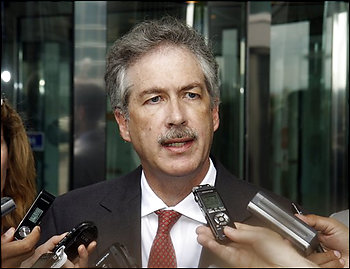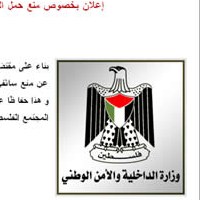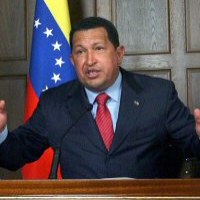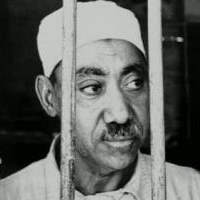![]()
Fri, March 18, 2011 | The Rubin Report | By Barry Rubin
No Wonder Hillary Resigned! Mr. Burns Explains U.S. Middle East Policy
For a comprehensive statement of current U.S. Middle East policy you can’t do better than the testimony of Undersecretary of State for Political Affairs William J. Burns at the Senate Committee on Foreign Relations on March 17, 2011.
It’s horrifying. Here’s my summary of the key point:
The United States will press for political reform and urge governments to talk to the opposition in Bahrain, Egypt, Jordan, Morocco, and Tunisia. The United States will NOT press for political reform or urge governments to talk to the opposition in the Gaza Strip, Iran, Lebanon, Sudan, and Syria.
What do the governments in the first paragraph have in common? They have been friendly to the United States.
What do the governments in the second paragraph have in common? They are currently unfriendly to the United States.
In other words, the policy is to pressure your friends (they become weaker); engage your enemies (they become stronger). It is the exact opposite of what U.S. policy should be at this time.
There is a carefully thought out rationale for this policy. It is this:
If relatively moderate countries open their political process (even if it gives Islamists a chance to take power), they will become stronger and less likely to have radical revolutions. Their success will then show that the radical regimes have failed and everyone will see democracy works better. So the radicals will all decide to become moderate or be overthrown by their own people.
The above paragraph is not a joke or satire. This idea is very clearly expressed in the testimony and in other administration statements. This is a historical theme in U.S. foreign policy.
For example, this was precisely the idea regarding the Palestinians. The United States and others would pour money into the West Bank, making the Palestinian Authority a success. Meanwhile, Gaza would sink into stagnation and the people there would want to have a good life, like those on the West Bank.
Of course, the Obama Administration then pressed Israel to drop the sanctions and pumped money (indirectly) into the Gaza Strip.
What else is wrong with this policy? A lot, but briefly:
— It ignores the fact that radical dictators will kill people to stay in power.
— Reform can do more to weaken regimes than the subversion of radical oppositionists.
— Ideology is a powerful factor sometimes transcending material well-being.
— The radicals think they’re winning so why should they change? The moderates think they’re losing and are more likely to change sides or appease the radicals.
— Radical nationalists or Islamists can use the opening in politics to win power and then transform the state into an aggressive, anti-American country. To some extent, this is what happened in Iran.
A more realistic U.S. government would have put some tough language into Burns’ testimony to cover itself by saying, for example, that it would back the democratic opposition in Iran. But the Obama administration is so ideologically blinded and has been given such a free pass by the mass media that it doesn’t realize how obviously far-out it behaves.
In giving this testimony — and this is only my opinion — Burns must have been the most horrified person in the Senate hearing room. After all, not only is he the highest-ranking career person in the State Department, he’s also a veteran of three decades of policymaking on the Middle East.
Much of what he said — expressing U.S. (i.e., White House) policy runs directly counter to everything he’s believed, advocated, and implemented in his career. Let’s go through it in detail, keeping in mind that Burns is just President Barack Obama’s messenger here.
His testimony expresses wild enthusiasm for recent Arab political upheavals. There’s no hint about throwing out a 32-year-old alliance with Egypt’s regime. Nor is there any whisper of an Islamist threat (no mention of Islamism or of the Muslim Brotherhood), or of an Iranian strategic threat (except for a phrase at the very end), much less from the radicalism of the Syrian regime, Hamas, and Hizballah. There’s no mention of Turkey’s change of sides or of any strategic problems whatsoever.
In a competent administration, if only to cover itself, the testimony would have included real warnings; reservations; strategic considerations; concerns over protecting U.S. interests, stress on the need to maintain U.S. leadership and credibility; and the importance of helping allies protect themselves.
Instead we get this community organizer-style rhetoric:
“The revolutions…are about the brave, proud, and determined people of Arab societies, intent upon better governance and more economic opportunities, intent upon erasing the disconnect between the rulers and the ruled that for so long has been so stifling for so many. And they’re about the universal values that the President spoke about two years ago in Cairo–the right of peaceful assembly, freedom of speech, and the right to determine one’s own destiny….”
“It is a moment of great possibility for American policy and help; a moment when the peaceful, homegrown, non-ideological movement surging out of Tahrir Square offers a powerful repudiation of al-Qaida’s false narrative that violence and extremism are the only ways to effect change.”
Here we see another administration theme: America’s only enemy is a tiny group called al-Qaida. America’s enemy is not revolutionary Islamism, which already controls entire countries and animates movements that mobilize millions of people.
Strange, but neither al-Qaida nor any other radical Islamist force (Iran, Syria, Hamas, Hizballah, the Taliban, the Iraqi insurgents, or the Muslim Brotherhoods, as well as al-Qaida) seem the least bit worried about these upheavals. Perhaps the Obama Administration’s naive ideologues understand these things better than those who actually are Muslims, Arabs, speak the languages, and live in the Middle East.
Here is about all the lip service Burns’ testimony gives to the risks of Obama policy:
“But it is also a moment of considerable risk, because there is nothing automatic or foreordained about the success of such transitions. Helping to get them right is as important a challenge for American foreign policy as any we have faced since the end of the Cold War.”
“Helping to get them right!” Aside from being ungrammatical, do you think the Obama Administration is going to be able to help make Egypt into a moderate, stable, wealthy, happy, democratic state?
But there’s more. The administration’s policy then goes on to discredit the “war on terrorism” and battle with Islamism:
“The long-held conceit of many Arab leaders was that there were really only two political choices — the autocrats you know or the Islamic extremists you fear. That provided a convenient rationale for blocking real political outlets or broadened participation, and it ultimately produced the spontaneous combustion of Tahrir Square.”
But doesn’t that remain to be seen? That “spontaneous” combustion including a lot of anti-American far leftists and Muslim Brotherhood cadre. Those Arab leaders haven’t yet been proven wrong.
Imagine for the moment that you are a Saudi or Jordanian leader reading this. What would you say to the Obama Administration?:
You think the “Islamic extremists” are a mirage? You think Iran and its power is a conceit? Have you seen how many people were killed in Algeria, Lebanon, Iraq, and Afghanistan in such internal conflicts? They want to kill us as well. You Americans are idiots! Why should we pay attention to you?
Burns continues with phrases like “remarkable sense of public empowerment” and “a communications revolution that stripped governments of their old monopoly on the flow of information, made people more aware of what others had in other societies that they didn’t, and helped them mobilize without central leadership or conventional political organizations.”
Let’s be frank here: the revolutions in Tunisia and Egypt succeeded for one reason ultimately — that the armies supported them. They failed in Iran, Syria, Jordan, Saudi Arabia, Bahrain, and elsewhere because the security forces supported the regime. Let’s not get carried away with “public empowerment” and Facebook as the twenty-first century equivalent of Mao Zedong’s Little Red Book!
Burns continues with a lecture on political theory:
“Political systems and leaderships that fail to respond to the legitimate aspirations of their people become more brittle, not more stable. Popular pressures to realize universal values will take different shapes in different societies, but no society is immune from them. Political systems are a little like bicycles — unless they’re peddled forward, they tend to fall over.”
You see, weakening a friendly regime is always good! Change is always good! The people always want to realize “universal values” and merely do so in different ways (terrorism perhaps?).
Nobody could possibly be a radical nationalist, an Islamist, a militant anti-American or antisemite. They all want what Americans want. And unless you give the masses what they want, you fall from power, so you better give them what they want. It’s just a matter of negotiating the surrender terms.
There’s no way that Burns could really believe this stuff after three decades’ work on the Middle East.
He even calls this maxim an “inconvenient truth,” a reference to former Vice-President Al Gore’s global warming film. Yet despite Burns’ expression of guilt that past U.S. policy failed to recognize this building explosion of reformism and rebellion, the actual history of that policy shows something different. I participated in discussions with U.S. policymakers starting in the 1980s about the new generation, demographic shift, failure of Arab regimes, and other such factors. They weren’t so ignorant at all but understood the dangers involved, too.
Most obviously, there were attempts by President George W. Bush’s administration to push reform. But the current administration can’t say anything nice about its predecessor. And what about President Jimmy Carter’s push on democracy and human rights, including pressure on Iran’s shah to do precisely what the administration wants Arab leaders to do now? Oops. Better not mention that precedent or president.
But there’s more kumbaya babble instead of national interests’ diplomacy here. Burns says:
“It is in our long-term interest to support the emergence of more transparent and more responsive governments, who will ultimately make stronger and more stable partners….”
While he admits that “the short-term is likely to be pretty complicated and unsettling” Burns is basically saying that nothing can go wrong.
He refers to “a danger of authoritarian retrenchment….” In other words, the region can go “back” to a Mubarak-style regime. But how about change leading to a brand new type of totalitarianism like what happened in Iran?
Remember, no administration official can say the word “Islamism.” So instead Burns refers to how “predatory extremists” might take advantage of the situation, as if these are burglars rather than movements with an attractive ideology and mass base far stronger than the Facebook crowd.
Burns names “economic stagnation” and failure to improve people’s lives as factors which might help these unnamed extremists take over. Burns then makes solving these problems sound easy. “We can help produce private sector jobs desperately needed to keep pace with demography and expectations.” Really? They can’t even do that in America!
It’s all very well to say that an “independent media to hold people accountable” is absolutely necessary. But the media is likely to be highly partisan and often controlled by radicals.
Here’s my favorite sentence:
“Popularly elected governments sometimes taking sharper issue with American policies than their autocratic predecessors did, and elections sometimes producing uncomfortable results.”
You mean like Hamas in the Gaza Strip and Hizballah in Lebanon? Might the “uncomfortable results” include throwing out U.S. bases, sponsoring terrorism, starting wars, promoting hysterical anti-Americanism, little things like that?
Yet what is most shocking of all in the new American policy is the failure even to mention support for democratic movements against the governments of Iran and Syria. Democratic reform is presented as managing the collapse of America’s Arab friends rather than an American asset to use against those who are both its enemies and the enemies of freedom.
How can the U.S. government make promoting democracy its main priority without even mentioning the idea of vigorously promoting democracy in Iran or Syria or supporting the oppositions in those countries? Why does the Obama Administration engage its enemies (Syria, Hizballah, and even the Taliban) and enrage its friends?
This is a policy that supports “serious political reform” and dialogue with the opposition only in countries friendly to the United States! Have they thought about what this means: Jordan’s government being pushed into a deal with the Muslim Brotherhood, the Palestinian Authority pressed to set up a coalition with Hamas?
Only at the very end of Burns’ testimony, briefly and as an afterthought, comes the stuff that used to be U.S. Middle East policy before the triumph of Facebook democracy:
“Regional security: strengthening ties to the GCC states; in fighting terrorism; in preventing Iran from developing nuclear weapons and setting off a catastrophic regional arms race; in not losing sight of Iraq’s own crucial democratic transition and reintegration into the Arab world.”
Oh yes, almost forgot about that obsolete stuff. Is Burns’ statement the best America — the best even Obama — can do as the Middle East burns?
Perhaps Secretary of State Hillary Clinton decided to resign after reading Burns’ draft testimony. I sure would have done so if I were her.
About the author,
Barry Rubin is Director of the Global Research in International Affairs (GLORIA) Center and editor of the Middle East Review of International Affairs (MERIA) Journal. His books include Islamic Fundamentalists in Egyptian Politics and The Muslim Brotherhood (Palgrave-Macmillan); and The Long War for Freedom: The Arab Struggle for Democracy in the Middle East, a study of Arab reform movements (Wiley). GLORIA Center site: http://www.gloria-center.org His blog, Rubin Reports, http://www.rubinreports.blogspot.com.



 RSS
RSS












No Wonder #Hillary Resigned! Mr. Burns Explains U.S. Middle East Policy | #tcot http://j.mp/i6yrQu
RT @CrethiPlethi: No Wonder #Hillary Resigned! Mr. Burns Explains U.S. Middle East Policy | #tcot http://j.mp/i6yrQu
[…] Barry Rubin is Director of the Global Research in International Affairs (GLORIA) Center and editor of the Middle East Review of International Affairs (MERIA) Journal. His books include Islamic Fundamentalists in Egyptian Politics and The Muslim Brotherhood (Palgrave-Macmillan); and The Long War for Freedom: The Arab Struggle for Democracy in the Middle East, a study of Arab reform movements (Wiley). GLORIA Center site: http://www.gloria-center.org His blog, Rubin Reports, http://www.rubinreports.blogspot.com. via crethiplethi.com […]
RT @CrethiPlethi: No Wonder #Hillary Resigned! Mr. Burns Explains U.S. Middle East Policy | #tcot http://j.mp/i6yrQu